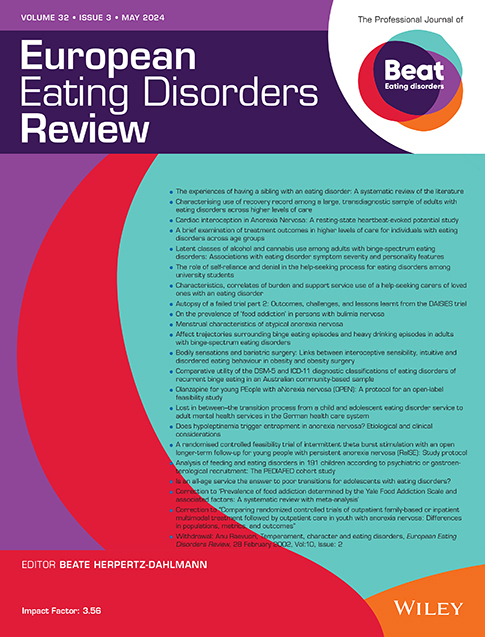Enhancing emotional abilities in anorexia nervosa treatment: A rolling-group cognitive remediation and emotional skills training protocol
Abstract
Introduction
Anorexia nervosa (AN) is characterised by limited remission rates and emotional dimensions are often neglected. Cognitive remediation and emotional skills training (CREST) protocol aims to address cognitive and emotional factors. This study evaluates the feasibility and effectiveness of a modified rolling-group CREST protocol in an inpatient setting.
Methods
Quasi-experimental design evaluated CREST protocol in a rehabilitation programme. A total of 116 females diagnosed with AN were included, of whom 63 were included in the CREST protocol and 53 in the standard rehabilitation treatment. Various standardized measures were employed to assess psychopathology. Data collection occurred longitudinally, before and after CREST implementation.
Results
No significant differences emerged between groups regarding changes in specific eating psychopathology. CREST group exhibited significant improvements in emotion regulation (p = 0.002) and social skills (p = 0.014), besides a reduction in alexithymia (p < 0.001) and cognitive rigidity (p = 0.013). Empathic features remained stable. Participants reported positive perceptions of the CREST intervention.
Discussion
The study highlights the potential benefits of integrating emotional training within multidisciplinary intensive treatment for AN. Results emphasise the importance of treatment protocol with more affective and hot-cognition-related interventions, beyond weight-related psychopathology. Implementing a rolling-group CREST protocol in an inpatient setting showed promise in enhancing the emotional abilities of AN patients.

 求助内容:
求助内容: 应助结果提醒方式:
应助结果提醒方式:


